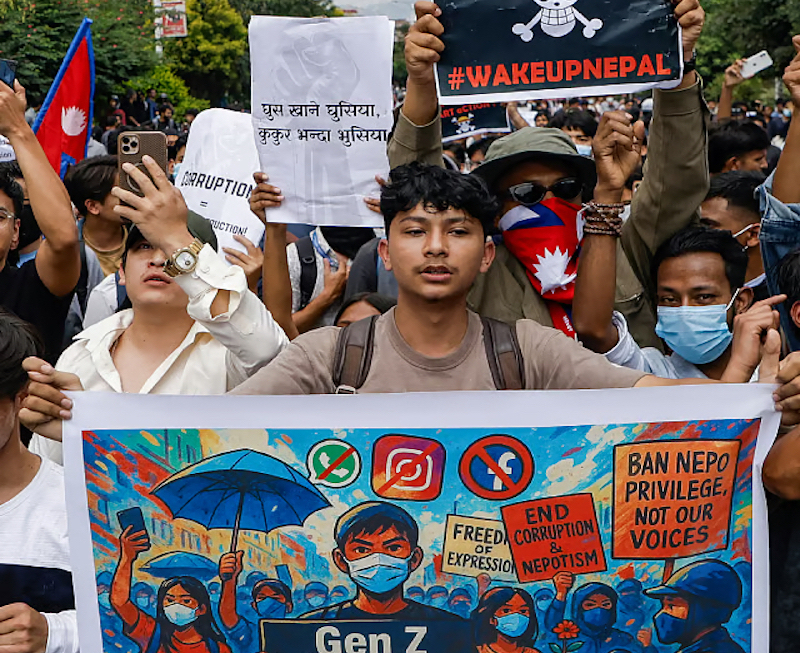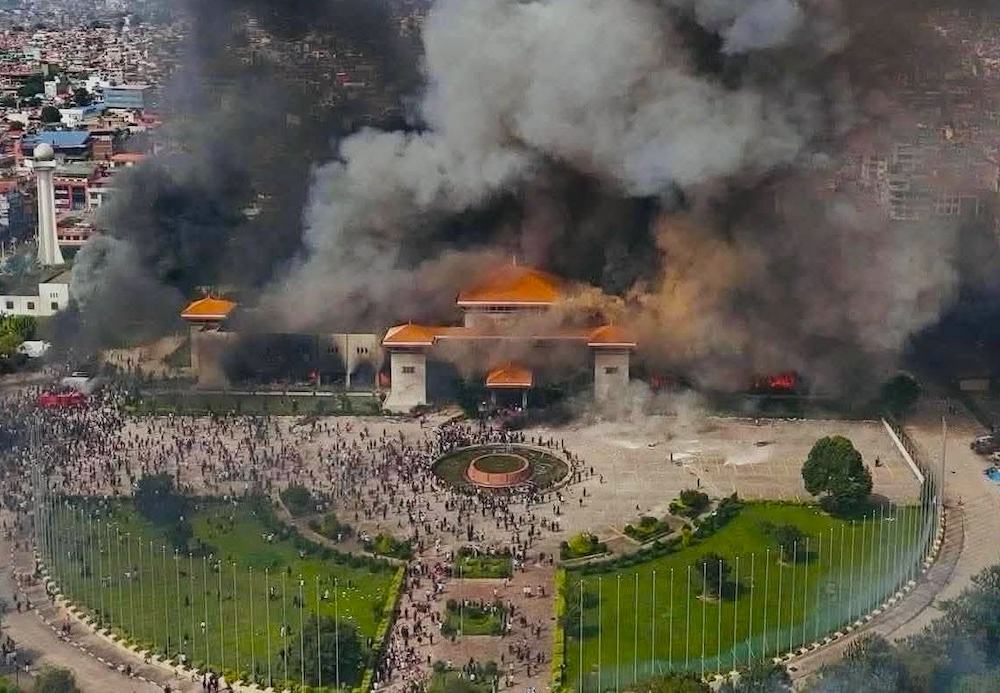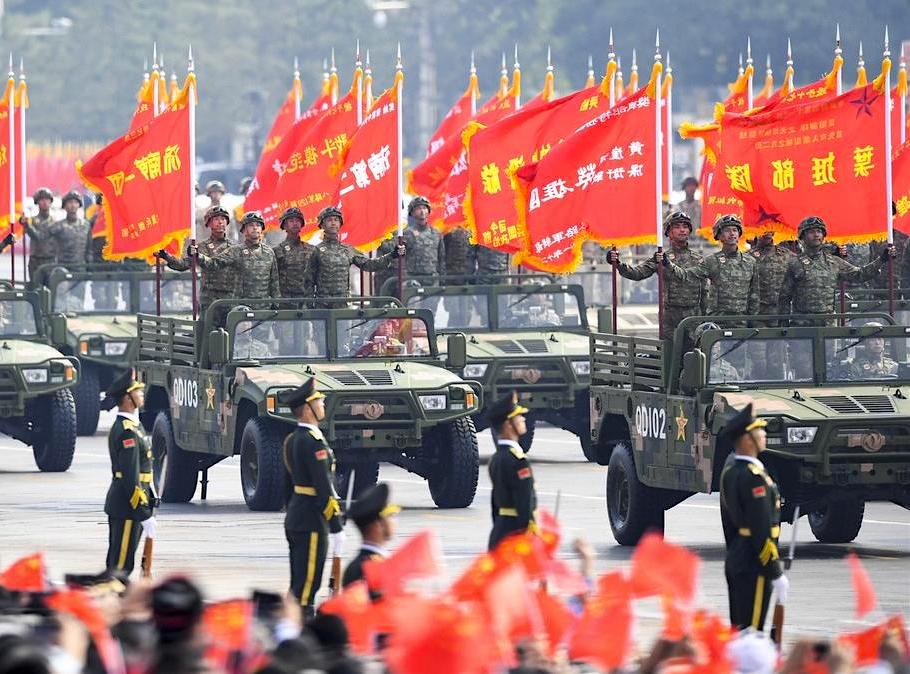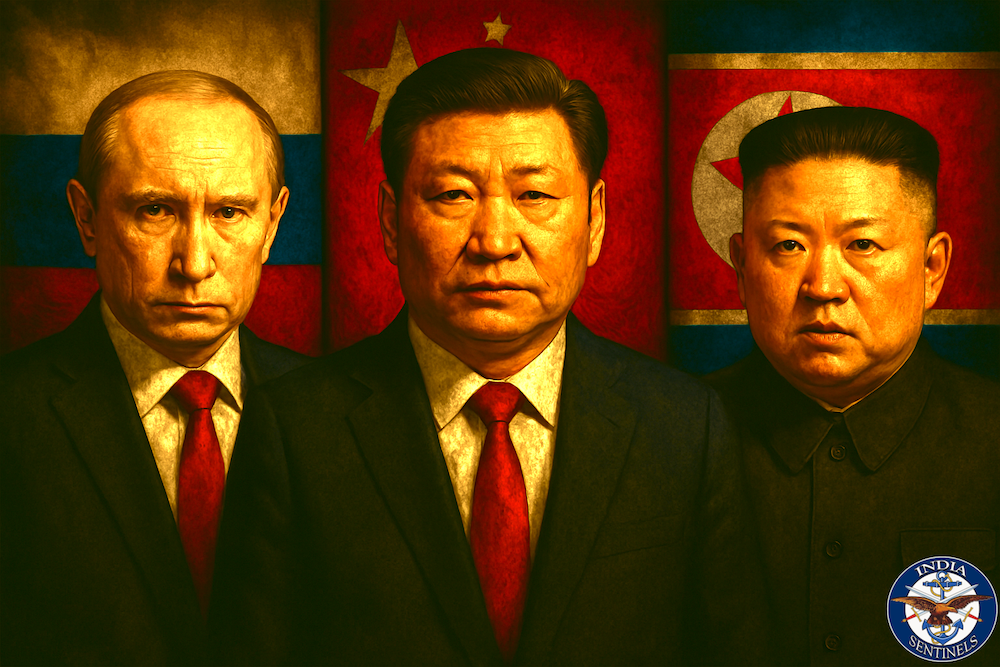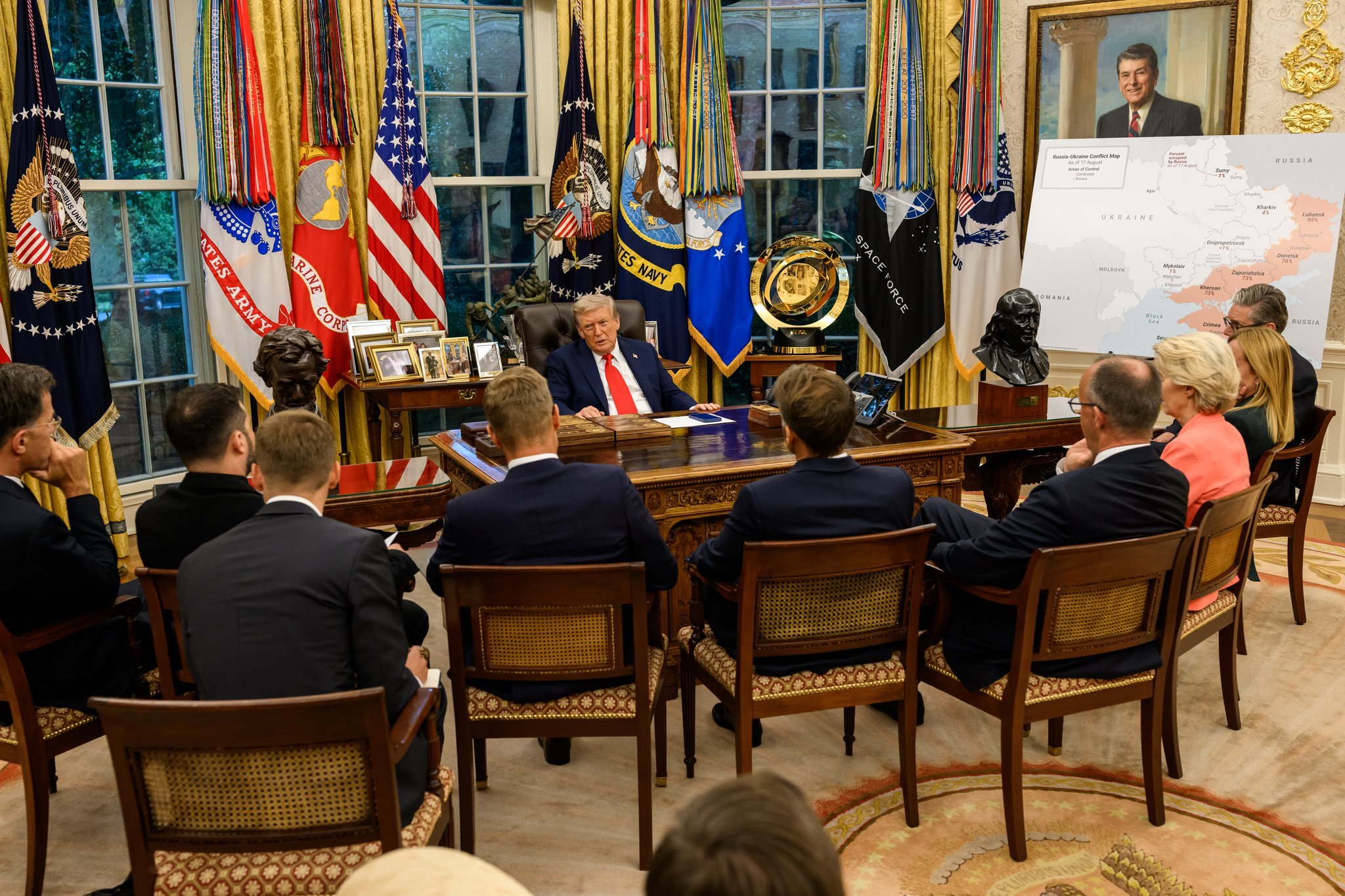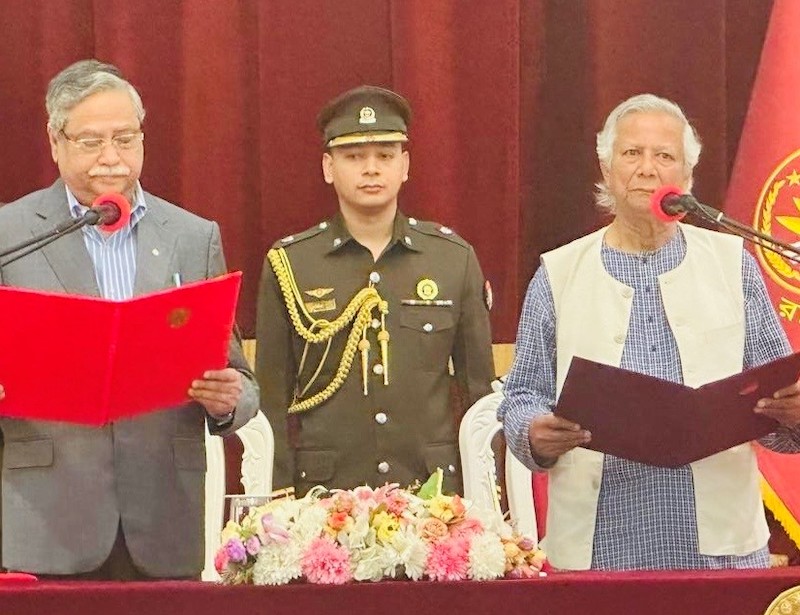 Bangladesh’s president, Mohammed Shahabuddin (L), administering the oath of office to Dr Muhammad Yunus as the chief advisor of the interim government. (Photo: X/@SwissAmbBD)
Bangladesh’s president, Mohammed Shahabuddin (L), administering the oath of office to Dr Muhammad Yunus as the chief advisor of the interim government. (Photo: X/@SwissAmbBD)
New Delhi: In a much-anticipated political development after Sheikh Hasina’s resignation, Bangladesh’s interim government, led by Nobel laureate Dr Muhammad Yunus, took the oath of office on Thursday. The swearing-in ceremony, held at the Bangabhaban (or Bongo Bhavan), was presided over by the country’s president, Mohammed Shahabuddin.
This 17-member interim administration, headed by Yunus, comes in the wake of the dissolution of Hasina’s Awami League government following her ouster and flight from Bangladesh as student protests and calls for her removal intensified.
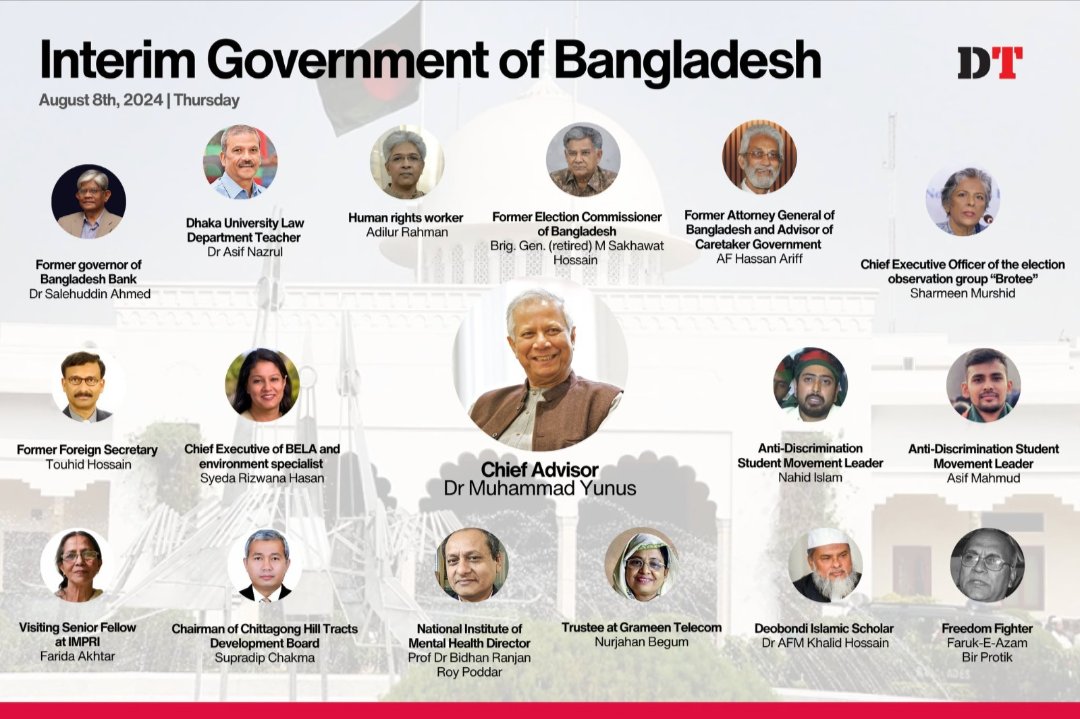 DT collage of Bangladesh interim government members photos. (Via X/@saliltripathi)
DT collage of Bangladesh interim government members photos. (Via X/@saliltripathi)
Interim government’s leadership and key members
Dr Muhammad Yunus: He will lead Bangladesh’s interim government as its chief advisor. Yunus is a globally renowned economist and social entrepreneur. He is the founder of the Grameen Bank and was awarded the Nobel peace prize in 2006 for his pioneering work in microcredit and microfinance. Yunus has been a prominent figure in advocating for economic and social reforms in Bangladesh. The Hasina government slapped 174 charges on him and convicted him in one, for which he was out on bail pending appeal.
Dr Salehuddin Ahmed: He will serve as an advisor in the interim government. A former governor of the Bangladesh Bank, where he implemented significant reforms to modernize the banking sector, Ahmed’s extensive experience in economics and public administration makes him a valuable asset to the interim administration.
Brigadier General (retired) M Sakhawat Hossain: He is another key advisor. A former election commissioner and retired brigadier general of the Bangladesh Army, Hossain brings a wealth of experience in security and defence. He is also a noted author and commentator on national and international security issues.
Mohammad Nazrul Islam (also known as Asif Nazrul): He is a law professor and civil society activist. He has contributed extensively to constitutional and international legal research and has been a vocal advocate for human rights and good governance. He will play the role of an advisor in the interim government.
Adilur Rahman Khan: He is a prominent human rights activist and the founder of “Odhikar” – a human rights organization. His work has focused on documenting human rights abuses and advocating for justice and accountability. He will have the post of an advisor in the interim government
AF Hassan Ariff: He is a former attorney general of Bangladesh. As an advisor to the interim government, his legal expertise and experience in public service are expected to play a crucial role in guiding the interim government through the legal and constitutional challenges ahead.
Mohammad Touhid Hossain: He is a former foreign secretary of Bangladesh. As an advisor to the interim government, he is expected to bring his diplomatic experience to the interim administration. His insights into international relations and foreign policy are anticipated to be instrumental in navigating Bangladesh’s external affairs during this transitional period.
Sayeda Rizwana Hasan: She is the chief executive of the Bangladesh Environmental Lawyers Association (BELA) and is known for her environmental advocacy. Her inclusion in the interim government as an advisor highlights the administration’s commitment to addressing environmental issues.
Farooq-e-Azam: He is a veteran of the 1971 Bangladesh Liberation War and has served in the Bangladesh Army after the country’s independence from Pakistan. He has been involved in various initiatives to support veterans and promote national security. His experience and dedication to the country are expected to be valuable assets to the interim government.
Dr AFM Khalid Hossain: He is a distinguished Bangladeshi Islamic scholar, educator, writer, researcher, editor, international Islamic speaker, and social reformer. He has served as the vice-president of Hefazat-e-Islam Bangladesh and the education advisor of Islami Andolan Bangladesh. He was also the professor and head of the department of Islamic History and Culture at Omargani MES College. He will also play the role of an advisor in the interim government.
Nahid Islam and Asif Mahmud Shojib Bhuiyan: The two are key coordinators of the Anti-discrimination Students Movement. They have been included in the interim government to represent the youth and student voices. Their involvement underscores the administration’s recognition of the pivotal role that young activists have played in the recent political upheaval.
Nurjahan Begum: She is a former acting managing director of Grameen Bank. She has been involved in various initiatives aimed at empowering women and promoting financial inclusion. She is also an advisor to the interim government.
The interim government has also kept the interests of the country’s minority communities and appointed advisors to represent them. They are:
Supradip Chakma: He is the chairman of the Chittagong Hill Tracts Development Board. He has been actively involved in advocating for the rights and development of the indigenous communities in the Chittagong Hill Tracts region. His work focuses on promoting sustainable development and ensuring the socio-economic upliftment of the indigenous population
Bidhan Ranjan Roy: He is a former director and professor at Bangladesh’s prestigious National Institute of Mental Health and Hospital. He has extensive experience in the field of mental health and has contributed significantly towards awareness of mental health and treatment in the country. His inclusion in the interim government highlights the administration’s commitment to addressing issues related to mental health.
Sharmeen Murshid: She is the Chief Executive Officer of Brotee – an organization dedicated to promoting democracy, human rights, and social justice. She has been actively involved in various initiatives aimed at empowering marginalized communities and ensuring their representation in the political process
Farida Akhter: She is the founding executive of UBINIG (Policy Research for Development Alternative) – an organization that works on sustainable agriculture, health, and women’s rights. She has been a vocal advocate for the rights of women and minority communities in Bangladesh.
UNDP Bangladesh is privileged to witness the oath ceremony of the Interim Government of Bangladesh, led by Prof. Yunus. We look forward to collaborate with partners to support inclusive, resilient & sustainable development, democratic governance and peace for all in Bangladesh. pic.twitter.com/8kwOuwoMfb
— Sonali Dayaratne (@SonaliDayaratne) August 8, 2024
Current Bangladesh situation
The formation of Bangladesh’s interim government comes at a time of heightened political tension and violence in the country. In response to the escalating violence, the interim government has pledged to restore peace and stability. Security forces have been deployed across major cities to maintain order and prevent further unrest.
While violence has ebbed in some parts of the country, it continues unabated in several other parts, especially urban areas. So far, over 200 people have been killed in the violence since Hasina’s ouster as the country’s prime minister. People and properties linked with Hasina’s Awami League have been specifically targeted across the country.
On Thursday, security forces rounded up hundreds of people involved in rioting, looting, and arson across the country. The interim government has also initiated dialogues with various political and civil society groups to address the underlying issues driving the protests.
The interim administration has emphasized the importance of non-violent resolution of conflicts and has called for restraint from both protesters and security personnel. Apart from this, it also assured the country that efforts are being made to ensure that the upcoming parliamentary elections are conducted in a free, fair, and transparent manner, with the hope that a legitimate and democratically elected government will bring an end to the current crisis.





